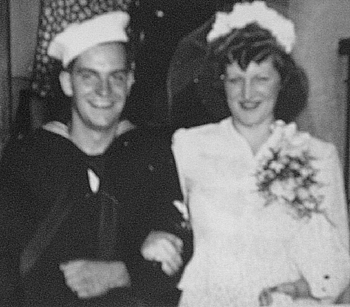 My granddad served in the Coast Guard during WWII, and when he came home, he married my grandmother, moved in with her (and her parents) in the house in Queens she’d lived in since she was 5 years old, and became a cop. Not a young life that particularly suggests a great deal of humor, but he was funny. Then again, he was the son of a Vaudeville clown, so clowning was, quite literally, in his blood.
My granddad served in the Coast Guard during WWII, and when he came home, he married my grandmother, moved in with her (and her parents) in the house in Queens she’d lived in since she was 5 years old, and became a cop. Not a young life that particularly suggests a great deal of humor, but he was funny. Then again, he was the son of a Vaudeville clown, so clowning was, quite literally, in his blood.He always had a joke or a story at the ready; good ones, too. He told them so well, it didn’t matter if you’d heard them before, although he was rarely repetitive, since there was always something new to amuse him.
There was one I heard a couple of times about a man who approached him with a story about his car being stolen or towed or something. At the time, my granddad was a uniformed beat cop, just back from the war and stationed at the docks; he couldn’t leave his post. He directed the man to see the desk clerk at the precinct, Officer Willenbacher. Off he went.
A few hours later, the man returned. “Did you find Willenbacher?” my granddad asked.
“Did I?!” exclaimed the man. “Willenbacher told me to see Officer Quatfazzle, who told me to see Officer Erzberger, who told me to talk to Sergeant Ziggenfuss. Willenbacher, Quatfazzle, Erzberger, Ziggenfuss! Who the hell won this war?!”
The adults in the room always laughed at this story. So I did, too, even though I didn’t get it.
I knew it had something to do with the last names, which told the adults something that I didn’t understand. It was a great mystery to me, the information conveyed by surnames. My parents, both teachers, would sometimes talk about students they’d had years before, and, trying to remember a name, my dad would say, “Blond hair, big shoulders, Polish kid,” and my mom would say, “Wishnewski,” and my dad would say, “Right, that’s it.” And my grandmother would sit on the porch of her row house, with the two spinster sisters who were her downstairs tenants, being regaled with their stories of walking to and from the market—stories that would take longer to tell than the trip to the market itself.
“So then I bump into that nice Italian boy, what’s his name?” says Marie.
“Joey Garavalia,” says Clara.
“Right, Joey Garavalia,” says Marie. “So I says to him, I says—”
“She says to him, she says,” interrupts Clara, “how’s your mother, Joey? And he says to her, he says—”
“He says to me, he says,” interrupts Marie, “oh, she’s fine, Miss Marie. The doctor says to her, he says—”
“What did he say that doctor’s name was?” interrupts Clara. “Irish fella.”
“O’Connor,” says Marie. “Sounds like a good one, Millie. If you ever get the—”
“If you ever get the bursitis,” says Clara.
On and on they’d go. Mrs. Ostreicher, the nice Jewish lady. The Hungarian Mr. László. Back in those days, in the numbered streets of Glendale off Myrtle Avenue, identifying someone’s nationality also identified what street they lived on. Sometimes, even what side of the street. It wasn’t a judgment; it was a global positioning system.
I listened intently, trying to figure out how these three syllables were “Italian,” while those three were “German.” It seemed like a secret code I’d never break, never understand.
But slowly, as I got a bit older, the skis and the ellis and the Mcs and the steins all started to fall into a pattern that began to make sense. I could tell Latin names from British ones, Japanese names from African. Such a silly thing, in retrospect, but figuring out the secret of names was one of the first things that made me feel like I was well on my way to being a grown-up. I’d broken the code, and something that once seemed so elusive was now within my grasp. I could look at a name and know what it meant to the person to whom it belonged. It conveyed a history to me; it made me think about the whole world, and wonder what other mysteries were in it, waiting to be unraveled.
And I finally got the punchline of my granddad’s story.




Shakesville is run as a safe space. First-time commenters: Please read Shakesville's Commenting Policy and Feminism 101 Section before commenting. We also do lots of in-thread moderation, so we ask that everyone read the entirety of any thread before commenting, to ensure compliance with any in-thread moderation. Thank you.
blog comments powered by Disqus